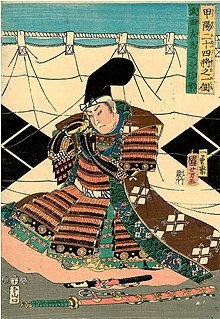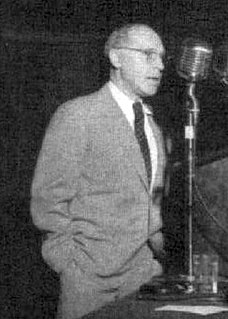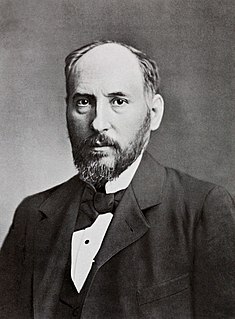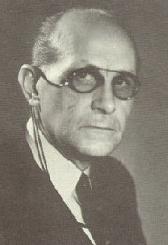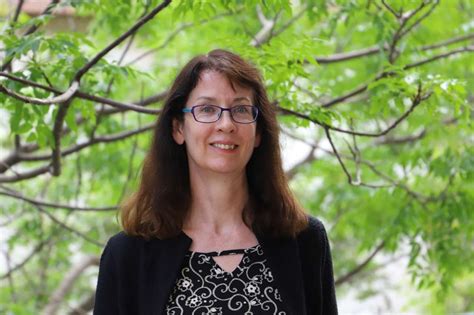Top 270 Exert Quotes & Sayings - Page 5
Explore popular Exert quotes.
Last updated on April 16, 2025.
Lean on thyself until thy strength is tried; Then ask God's help; it will not be denied. Use thine own sight to see the way to go; When darkness falls ask God the path to show. Think for thyself and reason out thy plan; God has His work and thou hast thine. Exert thy will and use for self-control; God gave thee jurisdiction of thy soul. All thine immortal powers bring into play; Think, act, strive, reason, and look up and pray.
A powerful athlete is not a strong athlete, but one who can exert his strength quickly. Since power equals force times speed, if the athlete learns to make faster movements he increases his power, even though the contractile pulling strength of his muscles remains unchanged. Thus, a smaller man who can swing faster may hit as hard or as far as the heavier man who swings slowly.
The fact that Trump's refused to divest from his labyrinth of business holdings, the fact that he's continuing to profit from his brand and indeed create all kinds of new opportunities to profit off the presidency is outrageous. The flip side is that he's left out a lot of levers through which to pressure him. You know, the reason you want a president to divest from his business holdings is that foreign governments can try to exert pressure on him by becoming customers of these hotels and inflating the value of how much they're willing to pay for a Trump brand.
Adding more people causes problems. But people are also the means to solve these problems. The main fuel to speed the world’s progress is our stock of knowledge; the brakes are our lack of imagination and unsound social regulations of these activities. The ultimate resource is people—especially skilled, spirited, and hopeful young people endowed with liberty—who will exert their wills and imaginations for their own benefits, and so inevitably they will benefit the rest of us as well.
We try to exert a Ted Williams kind of discipline. In his book The Science of Hitting, Ted explains that he carved the strike zone into 77 cells, each the size of a baseball. Swinging only at balls in his "best" cell, he knew, would allow him to bat .400; reaching for balls in his "worst" spot, the low outside corner of the strike zone, would reduce him to .230. In other words, waiting for the fat pitch would mean a trip to the Hall of Fame; swinging indiscriminately would mean a ticket to the minors.
I was very, very concerned about President Obama and how much executive order and how much executive power he tried to exert. But I think I want to be, and I think congress will be, a check on any executive, Republican or Democrat, that tries to grasp too much power. And really, a lot of the fault is not only presidents trying to take too much power, it's Congress giving up too much power.
Every wife ought to answer for her man. If the husband be engaged in a seditious club, or drinks mysterious healths, or be frugal of his candles on a rejoicing night, let her look to him and keep him out of harm's way; or the world will be apt to say, she has a mind to be a widow before her time. She ought, in such cases, to exert the authority of the curtain lecture; and if she finds him of a rebellious disposition, to tame him, as they do birds of prey, by dinning him in the ears all night long.
People tend to assess the relative importance of issues by the ease with which they are retrieved from memory—and this is largely determined by the extent of coverage in the media. Frequently mentioned topics populate the mind even as others slip away from awareness. In turn, what the media choose to report corresponds to their view of what is currently on the public’s mind. It is no accident that authoritarian regimes exert substantial pressure on independent media. Because public interest is most easily aroused by dramatic events and by celebrities, media feeding frenzies are common
It’s all about control. Control is illusory. No matter what university you go to, no matter what degree you hold, if your goal is to become master of your own destiny, you have more to learn. Parkinson’s is a perfect metaphor for lack of control. Every unwanted movement in my hand or arm, every twitch that I cannot anticipate or arrest, is a reminder that even in the domain of my own being, I am not calling the shots. I tried to exert control by drinking myself to a place of indifference, which just exacerbated the sense of miserable hopelessness.
We're being asked to continually be "authentic" and "honest" with the world through social media. There's a demand to post our wedding pictures, baby pictures (only minutes after the birth), our relationship status, and our grief and joys on Facebook and Instagram. Similarly, we construct persona through dating apps and networking sites. All of these social media networks exert pressure on us to share the personal details of our lives with unknown masses. So the pressure on the characters in "Openness" isn't merely romantic, but public/social as well.
I long ago abandoned the notion of a life without storms, or a world without dry and killing seasons. Life is too complicated, too constantly changing, to be anything but what it is. And I am, by nature, too mercurial to be anything but deeply wary of the grave unnaturalness involved in any attempt to exert too much control over essentially uncontrollable forces. There will always be propelling, disturbing elements, and they will be there until, as Lowell put it, the watch is taken from the wrist.
As science is more and more subject to grave misuse as well as to use for human benefit it has also become the scientist's responsibility to become aware of the social relations and applications of his subject, and to exert his influence in such a direction as will result in the best applications of the findings in his own and related fields. Thus he must help in educating the public, in the broad sense, and this means first educating himself, not only in science but in regard to the great issues confronting mankind today.
No man, however enslaved to his appetites, or hurried by his passions, can, while he preserves his intellects unimpaired, please himself with promoting the corruption of others. He whose merit has enlarged his influence would surely wish to exert it for the benefit of mankind. Yet such will be the effect of his reputation, while he suffers himself to indulge in any favourite fault, that they who have no hope to reach his excellence will catch at his failings, and his virtues will be cited to justify the copiers of his vices.
If I drive my car to the store, those carbon molecules that are emitted actually get into the atmosphere circulation systems and affect climate in a global basis. This is shocking, this is amazing! No one in the 18th Century would have believed that anything like this were at all possible and I don't think we have, as part of our common sense, morality, norms and values that are really responsive to those kinds of issues, to the kind of power that we now are able to exert over the future and over people who live very far from us.
We instinctively tend to limit for whom we exert ourselves. We do it for people like us, and for people whom we like. Jesus will have none of that. By depicting a Samaritan helping a Jew, Jesus could not have found a more forceful way to say that anyone at all in need - regardless of race, politics, class, and religion - is your neighbour. Not everyone is your brother or sister in faith, but everyone is your neighbour, and you must love your neighbour.
Criticism is a study by which men grow important and formidable at very small expense. The power of invention has been conferred by nature upon few, and the labour of learning those sciences which may, by mere labour, be obtained, is too great to be willingly endured; but every man can exert some judgment as he has upon the works of others; and he whom nature has made weak, and idleness keeps ignorant, may yet support his vanity by the name of critic.
[My Book] will endeavour to establish the principle[s] of reasoning in ... [geology]; and all my geology will come in as illustration of my views of those principles, and as evidence strengthening the system necessarily arising out of the admission of such principles, which... are neither more nor less than that no causes whatever have from the earliest time to which we can look back, to the present, ever acted, but those now acting; and that they never acted with different degrees of energy from that which they now exert.
I would be the last to deny that the greatest scientific pioneers belonged to an aristocracy of the spirit and were exceptionally intelligent, something that we as modest investigators will never attain, no matter how much we exert ourselves. Nevertheless ... I continue to believe that there is always room for anyone with average intelligence ... to utilize his energy and ... any man could, if he were so inclined, be the sculptor of his own brain, and that even the least gifted may, like the poorest land that has been well-cultivated and fertilized, produce an abundant harvest.
I want to reassert again the position of the United States that with regards to Iran, we will not allow Iran to develop a nuclear weapon, period. We will not allow them to develop a nuclear weapon, and we will exert all options in the effort to ensure that that does not happen...The United States stands firmly with Israel, and we have a rock solid commitment to the security of Israel and to the security of its citizens.
As long as we cling to the superstition that we must look to government for money supply, instead of requiring it to look to us, just so long must we remain the subjects of government and it is vain to follow this or that policy or party or ism in the hope of salvation. We can control government and our own destiny only through our money power and until we exert that power it is useless for us to debate the pros and cons of political programs.
How our governments need standards of integrity! How our communities need yardsticks to measure decency! How our neighborhoods need models of beauty and cleanliness! How our schools need continued encouragement and assistance to maintain high educational standards! Rather than spend time complaining about the direction in which these institutions are going, we need to exert our influence in shaping the right direction. A small effort by a few can result in so much good for all of mankind.
Though there is a benevolence due to all mankind, none can question but a superior degree of it is to be paid to a father, a wife, or child. In the same manner, though our love should reach to the whole species, a greater proportion of it should exert itself towards that community in which Providence has placed us. This is our proper sphere of action, the province allotted us for the exercise of our civil virtues, and in which alone we have opportunities of expressing our goodwill to mankind.
The noblest calling in the world is motherhood. True motherhood is the most beautiful of all arts, the greatest of all professions. She who can paint a masterpiece, or who can write a book that will influence millions, deserve the plaudits and admiration of mankind; but she who rears successfully a family of healthy, beautiful sons and daughters whose immortal souls will exert influence throughout the ages long after paintings shall have faded, and books and statues shall have decayed or been destroyed, deserves the highest honor that man can give, and the choicest blessings of God.
If only one country, for whatever reason, tolerates a Jewish family in it, that family will become the germ center for fresh sedition. If one little Jewish boy survives without any Jewish education, with no synagogue and no Hebrew school, it [Judaism] is in his soul. Even if there had never been a synagogue or a Jewish school or an Old Testament, the Jewish spirit would still exist and exert its influence. It has been there from the beginning and there is no Jew, not a single one, who does not personify it.
We could say that the human race is a great coauthorship in which we are collaborating with God and nature in the making of ourselves and one another. From this there is no escape. We may collaborate either well or poorly or we may refuse to collaborate, but even to refuse to collaborate is to exert an influence and to affect the quality of the product. This is only a way of saying that by ourselves we have no meaning and no dignity; by ourselves we are outside the human definition, outside our identity.
Health education emphasizing risks is a form of pedagogy, which, like other forms, serves to legitimize ideologies and social practices. Risk discourse in the public health sphere allows the state, as the owner of knowledge, to exert power of the bodies of its citizens. Risk discourse, therefore, especially when it emphasizes lifestyle risks, serves as an effective Foucauldian agent of surveillance and control that is difficult to challenge because of its manifest benevolent goal of maintaining standards of health. In doing so, it draws attention away from the structural causes of ill-health.
From the standpoint of daily life, however, there is one thing we do know: that we are here for the sake of each other - above all for those upon whose smile and well-being our own happiness depends, and also for the countless unknown souls with whose fate we are connected by a bond of sympathy. Many times a day I realize how much my own outer and inner life is built upon the labors of my fellow men, both living and dead, and how earnestly I must exert myself in order to give in return as much as I have received.
At times we are thrown suddenly into positions that seem too big for us and for which we have little preparation. The Lord stimulates our growth this way.... The Lord blesses us far beyond our natural ability and experience. However, it has been my experience that he expects us to quickly exert ourselves and acquire the things we need. He gives us a little time to improve our management skills and detailed knowledge so that we don't have to rely upon him for everything. We'll always need inspiration in these areas we couldn't possibly understand without his help.
For some people, it's very easy to be spontaneous and they can pour out the most wonderful stuff. But it's really hard to exert control over it, to think, 'Well, this could be different. This could go in the opposite order, there could be more here and less there.' For other people, it's much easier to have rules and a methodology, but much harder to let loose and allow their feelings to come pouring out on the page. They're more shy or they're just more distant from their emotions. I think everybody starts with one or the other.









